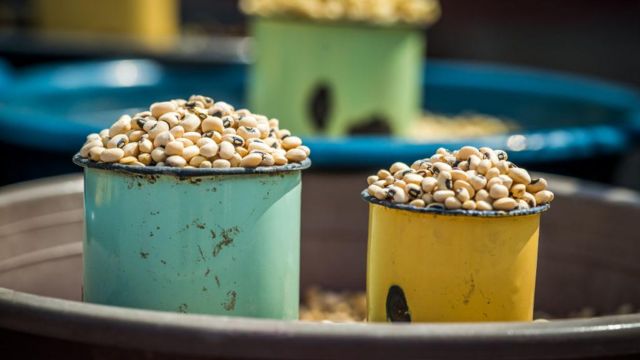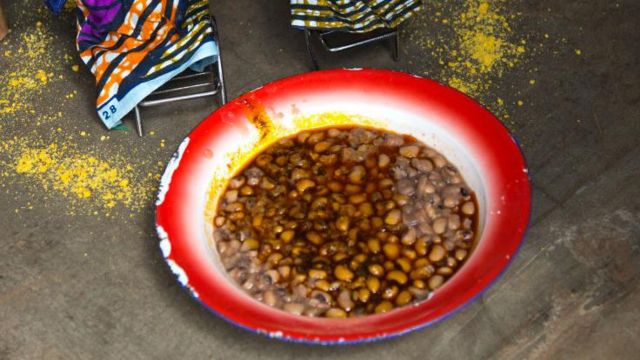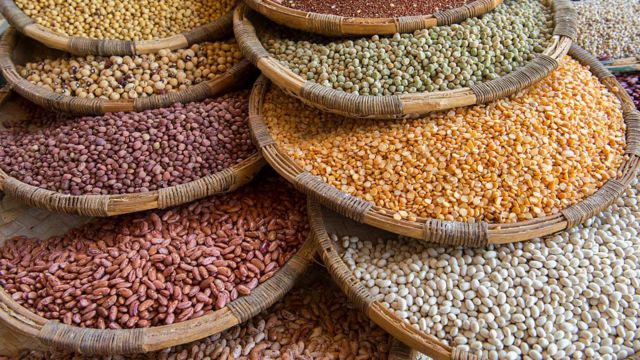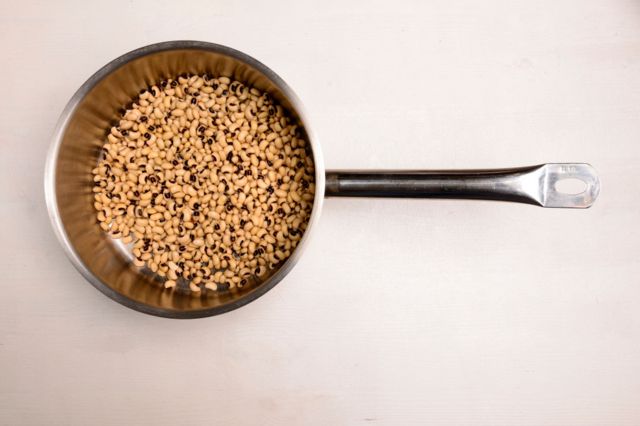
Wia dis foto come from, Getty Images
- Author, BBC Ideas
- Role, In collaboration with the University of Oxford
Humanity dey face multitude of threats wey dey for existence, from climate change go malnutrition and di rising cost of living.
Shey na pulses be di ansa to di world's problems?
E get plenti staple food from almost every culture around di world, and na for very good reason.
Wit around 40,000 different varieties, dem dey highly versatile, nutritious, cheap and great for di environment.
Part of di legume family, botanically dem be vegetable and dey for many different shapes and sizes, from fresh beans and peas to dried seeds like lentils and chickpeas.
If you no know whether make you treat dem as vegetable or a protein foryour plate, di ansa be say dem fit be any of di two or even both.
For example, fresh peas and green beans dey considered as starchy vegetables, while, becos of dia high protein content, kidney beans, black beans and chickpeas dem be members of both food groups.
In a world wia 2.5 billion people are overweight, obese or malnourished, beans na nutritional all-rounder.
Not only be say dem be cheap substitute for animal products, dey also dey low in fat, rich in nutrients, as well as protein, iron, zinc and fibre.
Think burritos with beans, rice with lentils, chickpeas with couscous or dhal and chapatis.
Gases

Wia dis foto come from, Getty Images
While beans dey well known for dia role in, to put it delicately, off-gassing, e fit also do di opposite.
Legumes dey play a unique and important role in crucial ecosystems such as forests, grasslands and wetlands.
Bacteria for dia roots take nitrogen from di atmosphere and store am for di soil.
Dis process, wey dem know as nitrogen fixation, not only provides nutrients for trees and oda plants, but e dey acts as a natural fertiliser in agriculture, greatly reducing di need for synthetics and reducing chemical pollution.
In a world of rising temperatures, pulses na survivors, wey fit grow for a wide range of climates.
And dem no only dey resilient, but on average require less water for dia production dan rice, wheat or animal products.
Wen be say global water demand dey likely to increase by more dan 40 per cent by 2030, na big plus.
However...

Wia dis foto come from, Getty Images
Some pulses, like soyabeans, don be cause for concern at many times.
Ogbonge pipo bin once think say di isoflavones wey dey soya fit cause health problems by mimicking di hormone oestrogen.
Fortunately, more recent studies never find any evidence of dis.
In fact, modern research don indicate say soya fit even reduce dirisk of cancer and helep keep hearts healthy.
Anoda concern wey dey be say soya cultivation lead to deforestation in places like diAmazon.
Doz who defend di crops however pass di buck to odas.
Dem point out say almost 80% of di soya produced for di region is used to feed di animals wey dey feed us.
As dat na di case, dey say, if we eat less meat and more soya, we go gatz use less land, which go mean less pressure to convert forests and natural habitats to farmland.
In di end, like almost everytin else for life, pulses no dey perfect.
Sometimes dem fit cause discomfort, not just environmental but also individual discomfort.
Doz wey neva get am consistently for dia diet fit need to introduce dem slowly to get used to dia bulk and high fibre content.

Wia dis foto come from, Getty Images
Some of di suffering of conditions - like irritable bowel syndrome - as e dey found say e fit get worse by some pulses, soaking and cooking dem thoroughly fit helep.
Kidney beans and cannellini beans contain high levels of lectin, a protein wey make dem toxic, so dey gatz dey cooked properly to avoid food poisoning if na dry or raw dem buy am.
Overall, however, while pulses no ey expected to fix all di bad tins wey dey di world, dem get chance to make am better wit dia incredible abundance, nutritional value, environmental benefits and di countless delicious ways dem fit eat am.
In addition, dey contain indigestible carbohydrates wey feed di bacteria for di di large intestine, making dem excellent for our intestines.
All pulses contain a mix of essential amino acids, and among dem soya bin stand out as having di best proportions for our health.
Odas no get di same balance, but around di world dem dey traditionally paired with oda foods wey make dishes nutritionally complete.
"fit" - Google News
August 28, 2023 at 07:44PM
https://ift.tt/5Evrjis
Why beans fit be di solution to many of di world's problems - BBC
"fit" - Google News
https://ift.tt/nN24x0H
https://ift.tt/nxJTvqz
Bagikan Berita Ini














0 Response to "Why beans fit be di solution to many of di world's problems - BBC"
Post a Comment